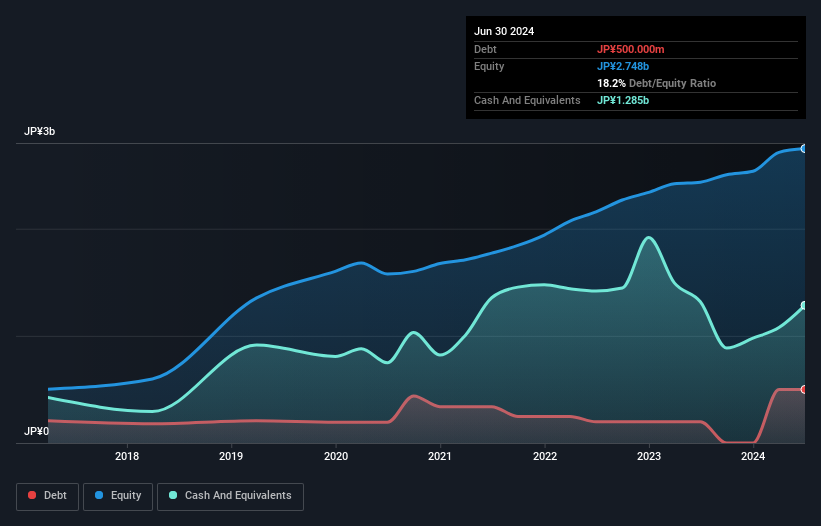Some say volatility, rather than debt, is the best way to think about risk as an investor, but Warren Buffett famously said that 'Volatility is far from synonymous with risk.' When we think about how risky a company is, we always like to look at its use of debt, since debt overload can lead to ruin. We note that gooddays holdings, Inc. (TSE:4437) does have debt on its balance sheet. But is this debt a concern to shareholders?
When Is Debt Dangerous?
Debt assists a business until the business has trouble paying it off, either with new capital or with free cash flow. Part and parcel of capitalism is the process of 'creative destruction' where failed businesses are mercilessly liquidated by their bankers. However, a more usual (but still expensive) situation is where a company must dilute shareholders at a cheap share price simply to get debt under control. Having said that, the most common situation is where a company manages its debt reasonably well - and to its own advantage. The first step when considering a company's debt levels is to consider its cash and debt together.
See our latest analysis for gooddays holdings
How Much Debt Does gooddays holdings Carry?
As you can see below, at the end of June 2024, gooddays holdings had JP¥500.0m of debt, up from JP¥198.0m a year ago. Click the image for more detail. But it also has JP¥1.29b in cash to offset that, meaning it has JP¥785.0m net cash.

How Strong Is gooddays holdings' Balance Sheet?
The latest balance sheet data shows that gooddays holdings had liabilities of JP¥1.96b due within a year, and liabilities of JP¥93.0m falling due after that. Offsetting these obligations, it had cash of JP¥1.29b as well as receivables valued at JP¥1.32b due within 12 months. So it can boast JP¥544.0m more liquid assets than total liabilities.
This surplus suggests that gooddays holdings has a conservative balance sheet, and could probably eliminate its debt without much difficulty. Succinctly put, gooddays holdings boasts net cash, so it's fair to say it does not have a heavy debt load!
And we also note warmly that gooddays holdings grew its EBIT by 16% last year, making its debt load easier to handle. There's no doubt that we learn most about debt from the balance sheet. But you can't view debt in total isolation; since gooddays holdings will need earnings to service that debt. So when considering debt, it's definitely worth looking at the earnings trend. Click here for an interactive snapshot.
Finally, a company can only pay off debt with cold hard cash, not accounting profits. While gooddays holdings has net cash on its balance sheet, it's still worth taking a look at its ability to convert earnings before interest and tax (EBIT) to free cash flow, to help us understand how quickly it is building (or eroding) that cash balance. Over the last three years, gooddays holdings recorded negative free cash flow, in total. Debt is far more risky for companies with unreliable free cash flow, so shareholders should be hoping that the past expenditure will produce free cash flow in the future.
Summing Up
While it is always sensible to investigate a company's debt, in this case gooddays holdings has JP¥785.0m in net cash and a decent-looking balance sheet. And we liked the look of last year's 16% year-on-year EBIT growth. So we are not troubled with gooddays holdings's debt use. The balance sheet is clearly the area to focus on when you are analysing debt. However, not all investment risk resides within the balance sheet - far from it. We've identified 2 warning signs with gooddays holdings , and understanding them should be part of your investment process.
At the end of the day, it's often better to focus on companies that are free from net debt. You can access our special list of such companies (all with a track record of profit growth). It's free.
New: AI Stock Screener & Alerts
Our new AI Stock Screener scans the market every day to uncover opportunities.
• Dividend Powerhouses (3%+ Yield)
• Undervalued Small Caps with Insider Buying
• High growth Tech and AI Companies
Or build your own from over 50 metrics.
Have feedback on this article? Concerned about the content? Get in touch with us directly. Alternatively, email editorial-team (at) simplywallst.com.
This article by Simply Wall St is general in nature. We provide commentary based on historical data and analyst forecasts only using an unbiased methodology and our articles are not intended to be financial advice. It does not constitute a recommendation to buy or sell any stock, and does not take account of your objectives, or your financial situation. We aim to bring you long-term focused analysis driven by fundamental data. Note that our analysis may not factor in the latest price-sensitive company announcements or qualitative material. Simply Wall St has no position in any stocks mentioned.
About TSE:4437
gooddays holdings
gooddays holdings, Inc. leases housing properties in Japan.
Excellent balance sheet with questionable track record.
Market Insights
Community Narratives





